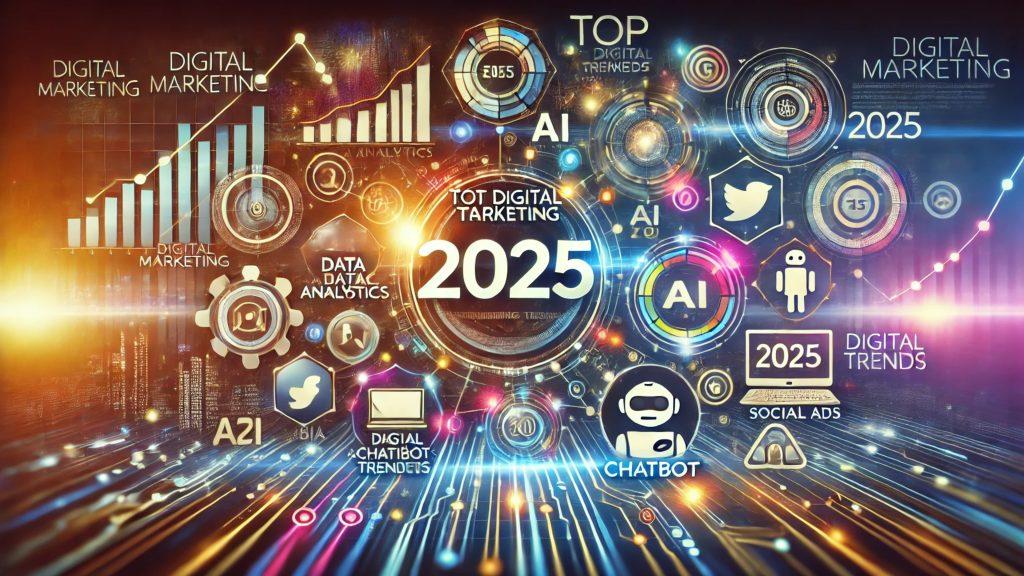The marketing landscape in 2025 is undergoing transformative changes driven by advancements in technology, evolving consumer preferences, and global socio-economic shifts. Companies are leveraging AI, machine learning, augmented and virtual reality, and data-driven insights to create highly personalized and impactful campaigns.
These technologies are accompanied by a growing emphasis on sustainability and purpose-driven branding, as ethical practices become integral to brand identity.
Artificial Intelligence and Machine Learning in Marketing
Artificial intelligence and machine learning are revolutionizing marketing by automating processes that once required significant human intervention. AI-driven tools can now craft and execute campaigns with unprecedented efficiency, from predictive analytics to dynamic content generation. This allows businesses to save time and resources while ensuring high levels of precision.
One of the most significant contributions of AI is its ability to deliver personalized experiences at scale. By analyzing user behavior, preferences, and interactions, AI algorithms create tailored content for every individual, improving engagement and conversion rates.
Immersive Experiences with AR and VR
Augmented reality (AR) is becoming a cornerstone of digital marketing. Brands are using AR to offer consumers interactive experiences, such as virtual try-ons for fashion and beauty products, or home visualization tools for furniture purchases. These experiences not only captivate users but also drive purchasing decisions.
Virtual reality (VR) is emerging as a powerful storytelling medium. Companies use VR to immerse consumers in branded environments, providing experiences that leave a lasting impression. From virtual tours to interactive games, VR enhances brand storytelling in ways traditional media cannot.
Data-Driven Insights for Precision Targeting
The reliance on big data continues to grow as marketers seek to refine their targeting strategies. Data analytics tools enable companies to dissect vast amounts of information, identifying patterns and trends that guide campaign decisions.
Predictive analytics tools help marketers anticipate consumer behavior, enabling proactive campaign adjustments. These tools use historical data to forecast future trends, ensuring timely and relevant marketing efforts.
Sustainability and Purpose-Driven Branding
Consumers are increasingly favoring brands that prioritize sustainability and ethical practices. From using eco-friendly packaging to committing to fair trade, businesses are aligning their values with consumer expectations.
Purpose-driven branding also hinges on transparency. Companies are making their operations more open to public scrutiny, showcasing their commitment to ethical practices and fostering deeper trust with their audience. To effectively communicate these values and build a strong market presence, many businesses partner with a B2B branding agency, which specializes in creating strategies that resonate with other businesses and highlight ethical and sustainable practices.
Leveraging Technology in Entertainment
Entertainment platforms are integrating AI to personalize content recommendations, keeping viewers engaged. Advanced algorithms analyze user behavior to suggest movies, shows, or music that align with individual tastes.
The entertainment industry is also adopting AR and VR to create immersive and interactive experiences. From virtual concerts to AR-enabled gaming, these technologies are reshaping how audiences interact with entertainment content.
The Role of Geolocation in Marketing
The online gambling industry is increasingly using geolocation technology to target customers with precision, ensuring compliance with state regulations while enhancing user experience. For example, top sports betting apps in Maryland are leveraging geolocation tools to attract local bettors and offer tailored promotions ahead of the NFL Super Bowl, creating a seamless and location-specific betting experience.
Geolocation tools also empower brands to design hyper-localized marketing campaigns. By targeting users in specific regions, companies can deliver highly relevant offers and ads, increasing engagement rates.
Online Gambling and User Engagement
Online gambling platforms are embracing AI to enhance user engagement through personalized betting recommendations. These platforms analyze user data to suggest bets and promotions tailored to individual preferences.
Some of the trending online casino platforms have integrated AI to monitor and detect unusual user activity patterns, enhancing their ability to prevent fraudulent activities and ensuring a secure experience for their customers.
The Future of Augmented Marketing
Augmented marketing strategies are blending physical and digital experiences. For instance, QR codes on packaging lead consumers to AR experiences, creating a seamless journey from offline to online.
Brands are using gamification to engage users, integrating rewards and achievements into marketing campaigns. This approach not only drives participation but also fosters long-term loyalty.
Social Media as a Marketing Powerhouse
Social media platforms remain vital for marketing, with influencer partnerships playing a crucial role. Brands collaborate with influencers to reach niche audiences, leveraging their credibility to boost engagement.
Short-form content, such as TikTok videos and Instagram Reels, continues to dominate. Marketers are creating snappy, visually appealing content to capture audience attention in seconds. Tools like Wisery simplify link management, allowing users to create a dynamic link in bio that directs followers to their most important content, websites, and social profiles.
The Road Ahead
The future of marketing lies in continuous innovation. As technologies evolve and consumer expectations shift, brands must remain agile, adopting strategies that prioritize personalization, transparency, and engagement.
Collaboration will also define the next era of marketing. Industries, including entertainment and gambling, are working together to integrate advanced technologies, creating a cohesive and immersive experience for users.




